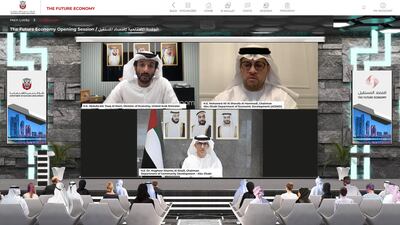The UAE aims to achieve the quickest economic recovery from the pandemic, according to the minister of economy Abdullah bin Touq Al Marri.
The country will also restore growth in a “gradual and studied path of transformation towards a sustainable economic and development model based on investment in knowledge, innovation and creativity," he said.
Speaking at the Abu Dhabi The Future event earlier this week, Mr Bin Touq said the country has 10 main goals to achieve its economic aims, including developing entrepreneurship and a supportive environment for small and medium enterprises, as well as attracting more investment into the country. Other priorities include improving the ease of doing business, reducing business cost and engaging the private sector in developing economic policies that support it, he added.
Last month, the UAE's leadership announced a new strategy called Operation 300bn to more than double the industrial sector's contribution to the country’s economic output from Dh133 billion to Dh300bn by 2031.
Emirates Development Bank will provide Dh30bn in financing over the next five years to support the strategy.
The UAE's economy is set to expand by 3.1 per cent in 2021, according to the International Monetary Fund.
Speaking at the same forum, Rashed Al Blooshi, undersecretary of Abu Dhabi Department of Economic Development said the emirate will focus on developing a number of non-oil sectors including industry, agriculture, tourism, health and technology to diversify its economy away from hydrocarbons.
“We know that 51 per cent of our economy relies on oil and 49 per cent on non-oil sectors. Therefore, the DED is keen to focus its strategic plan for the coming years on developing non-oil sectors,” Mr Al Blooshi said.
The emirate is also keen to attract new investors and the department will “facilitate the investor's journey to start their investment activity through easy access to the market, easy export of their products, and easy access to raw materials to start the processing and manufacturing”, he added.
Abu Dhabi, which holds about 6 per cent of the world’s proven oil reserves, is taking various measures to increase the contribution of the industrial sector to the emirate's economy.
Last year, the DED's Industrial Development Bureau signed a number of agreements with strategic entities and partners to support Abu Dhabi's industrial sector, including a deal with Etihad Credit Insurance Company to boost exports. It also signed an agreement with 10 banks to help domestic factories and businesses access finance.
The emirate is also developing its tourism sector and aims to attract new investments in agri-tech. The Abu Dhabi government has already earmarked Dh1bn for an agritech incentives programme under its Ghadan 21 accelerator initiative.
Abu Dhabi’s economy is poised to grow by 6 per cent to 8 per cent over the next two years, driven by the oil sector, government spending, financial services and foreign direct investment, Mohamed Ali Shorafa, chairman of ADDED said at the same event.
“The Abu Dhabi government has been taking proactive measures to support the private sector long before the pandemic,” he said.
“Such measures include the Ghadan 21 accelerators programme as well as a broad range of initiatives that incentivised companies and institutions enabling them to become more sustainable, thus making investment easier and increasing their contribution to the emirate’s GDP.”


